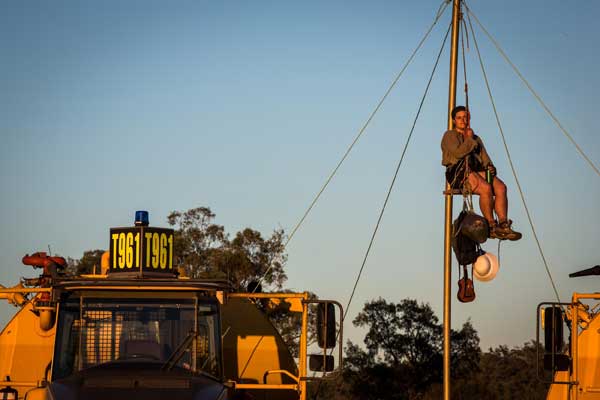It’s a hot day in NSW’s North-West. In the small town of Maules Creek over 150 farmers and environmentalists have chained themselves to all the access points leading into the Leard State Forest and the site of the proposed open cut coal mine.
The mine, owned by Whitehaven Coal, is set to be the biggest new coal mine in Australia and one of the last to be constructed following the coal commodity market crash which began in 2009.
A world away, environmentalists, farmers and fishermen from Batang in Indonesia gathered to protest the proposed coal-fired power plant in Central Java. If constructed, the power plant will be the biggest coal fired power plant in South East Asia, producing over 10 million tonnes of CO2.
Seven thousand people from five villages have spoken out against the proposed plant, staging more than 22 protests over the past few years and significantly delaying the project.
Over 50 local landowners have also withheld their consent from the Company, Adaro, and refused to sell the land needed for the power plant.
These two communities have never met each other. The men and women from Australia and Indonesia have no idea just how much they have in common, and how they are both battling the same company and the same destructive dynamic made possible by the globalised economy.
Two Japanese companies, J-Power and Itochu, have a hand in both Whitehaven’s Maules Creek coal mine and Adaro’s proposed Batang power plant. Itochu has a 15 per cent stake in Maules Creek and 32 per cent of Batang, while J-Power owns 10 per cent of Maules Creek, and a 35 per cent stake in Batang.
While the local communities struggle to protect their land, forests, water and future from the destruction of this mine and massive power plant, the companies funding the destruction and profiting from it, do so from a disinterested distance, and endure little scrutiny.
The globalised economy has brought about many advances of our world, but it has also introduced a sometimes brutal capacity to drive over the top of local communities, with a complete disregard for the lives destroyed in the process.

It is not surprising that companies like Whitehaven and Adaro act with impunity and no regard for local communities dissent when one realises that they do not rely on the country they operate in for financial backing.
With State and federal governments all open for business when it comes to the coal industry, the only oversight for the international projects has been left to the locals, who risk what little they have to fight against what they believe to be against public interest.
But the distant hand of foreign investment is no longer so invisible, with the global divestment movement bringing the issue of financing into public scrutiny.
The financial industry, which has long escaped deep scrutiny when it comes to their support of projects that impact on climate change and communities, is now at the forefront of a global fossil fuel divestment campaign.
UBS, the Swiss global financial services company, said to their clients this week: “Following on a series of recent meetings with our clients, we highlight the fossil fuel disinvestment campaign as potentially effective movement, defined as one that will act as a catalyst for change. Why? Because many of those engaged in the debate are the consumers, voters and leaders of the next several decades. In our view, this single fact carries more weight than any other data point on the planet for this issue: time, youthful energy and stamina are on the side of the fossil fuel divestment campaign.”
Beyond this, let’s not forget three crucial issues.
First, to divest from fossil fuels is to stand on the right side of history because climate change will eventually guarantee fossil fuels have no future – either that or humanity will have no future.
Second, given the political apathy of our leaders, who have stubbornly refused the global call for action, divestment campaigns have become the vehicle by which consumers can once again become citizens and exercise our human rights with agency.
And finally, let’s not forget the expansion of the fossil fuel industry is in its twilight. Whitehaven Coal’s shares have underperformed on the ASX S&P index by 68 per cent in the last five years, while Adaro’s power plant has yet to reach financial close after three years of local opposition.
The message is simple; foreign investors, save yourself a buck, invest in projects backed by the community on the right side of history.
* Julie Macken works for Greenpeace Australia Pacific and Marina Lou is from Greenpeace International.
Donate To New Matilda
New Matilda is a small, independent media outlet. We survive through reader contributions, and never losing a lawsuit. If you got something from this article, giving something back helps us to continue speaking truth to power. Every little bit counts.



